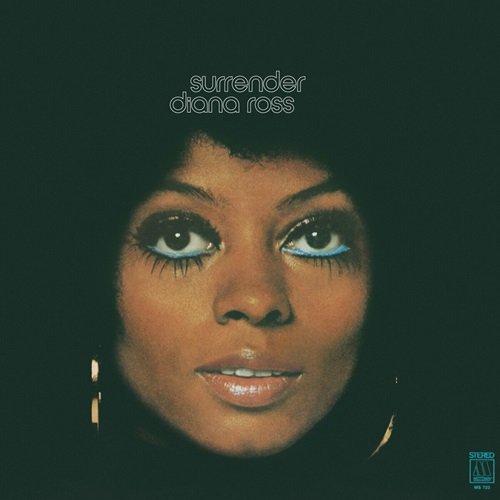Diana Ross - Surrender (Expanded Edition) (1971)
- 02 Aug, 16:55
- change text size:
Facebook
Twitter

Artist: Diana Ross
Title: Surrender
Year Of Release: 1971/2008
Label: UMG Recordings
Genre: Soul, R&B, Disco
Quality: Mp3 320 / Flac (tracks)
Total Time: 01:16:20
Total Size: 186/559 Mb
WebSite: Album Preview
Tracklist:Title: Surrender
Year Of Release: 1971/2008
Label: UMG Recordings
Genre: Soul, R&B, Disco
Quality: Mp3 320 / Flac (tracks)
Total Time: 01:16:20
Total Size: 186/559 Mb
WebSite: Album Preview
01. Surrender 2:55
02. I Can't Give Back The Love I Feel For You 3:21
03. Remember Me 3:32
04. And If You See Him 2:52
05. Reach Out I'll Be There 5:35
06. Didn't You Know (You'd Have To Cry Sometime) 3:05
07. A Simple Thing Like Cry 3:05
08. Did You Read The Morning Paper? 4:11
09. I'll Settle For You 3:07
10. I'm A Winner 3:13
11. All The Befores 4:44
12. I'm Still Waiting 3:45
13. Baby I'll Come 2:56
14. Remember Me (Diana! Vocal / Undubbed Stereo Mix) 3:32
15. Reach Out, I'll Be There (Alternate Vocal) 5:42
16. I Can't Give Back The Love I Feel For You (Alternate Vocal) 3:24
17. Ain't No Mountain High Enough (Alternate Vocal and Mix) 6:44
18. Remember Me (Alternate Vocal And Mix) 3:44
19. Surrender (Alternate Stereo Mix) 3:12
20. Remember Me (Demo Vocal) 3:39
Indisputably a legend, Diana Ross achieved stardom with the Supremes, a vocal group who during the 1960s grew from struggling hopefuls to Motown leaders to one of the most successful recording acts of all time. The singer broke from the group in 1970 and had immediate solo triumphs leading to more than two-dozen solo Top 40 pop hits. Among them are "Ain't No Mountain High Enough" (1970), "Love Hangover" (1976), "Upside Down" (1980), and "Endless Love" (1981), chart-topping classics traversing pop-soul, disco, and adult contemporary ballads. No matter the style or emotion, Ross has exuded uncommon levels of glamor and poise, always sounding connected to her material while conveying a sense of perseverance through even the most distressed romantic scenarios within her rich discography. Nominated for a dozen Grammy awards through her work with and without the Rock & Roll Hall of Fame-inducted Supremes, and nominated for an Academy Award for her starring role in Lady Sings the Blues, Ross has also been honored by the Recording Academy with a Lifetime Achievement Award. Her still-thriving, six-decade career was celebrated in 2019 with the documentary Diana Ross: Her Life, Love and Legacy and in 2021 she released her 25th solo album, Thank You.
A brief period in Bessemer, Alabama excepted, Diane Ernestine Earle Ross was brought up in Detroit, her place of birth. In 1959, shortly after she and her family had moved to the city's Brewster-Douglass Housing Projects, she joined Florence Ballard and Mary Wilson in the Primettes, who became the Supremes. From 1964 through 1969, the Motown group topped the Billboard Hot 100 a dozen times, beginning with "Where Did Our Love Go." They repeated that feat with the Grammy-nominated likes of "Baby Love" and "Stop in the Name of Love," continued with the immediate classic "Reflections" -- by which point they were billed as Diana Ross & the Supremes -- and concluded their run with "Someday We'll Be Together." Along the way, the Supremes became one of the most commercially successful groups of all time.
Primed for a solo career, Ross performed with the Supremes for the last time in January 1970. That June, Motown released Diana Ross, the singer's solo debut. Written and produced almost exclusively by Nickolas Ashford and Valerie Simpson, it yielded hit singles with "Reach Out and Touch (Somebody's Hand)" and a remake of "Ain't No Mountain High Enough," previously a smash for Marvin Gaye and Tammi Terrell. The latter A-side topped Billboard's Hot 100 and R&B charts and earned Ross a Grammy nomination in the category of Best Contemporary Vocal Performance, Female. The three LPs Everything Is Everything, the soundtrack to the television special Diana!, and Surrender (all 1971 and 1972) quickly followed and were eclipsed by Lady Sings the Blues (1972), the chart-topping soundtrack to the Motown-produced film of the same name. Ross made her acting debut as Billie Holiday and was nominated for an Academy Award for Best Actress.
Touch Me in the Morning, the Marvin Gaye duets LP Diana & Marvin, and Last Time I Saw Him (all 1973) soon followed. The biggest hit off these three was "Touch Me in the Morning" itself, written by Michael Masser and Ron Miller. Ross' second solo number one, it too resulted in a Grammy best-performance nomination, this time in the pop field. Live at Caesars Palace (1974), Ross' first solo concert recording, acted as a stop-gap before the romantic drama Mahogany, another big-screen Motown production with Ross as the lead actor. Composed by Masser and Gerry Goffin, the film's "Theme from Mahogany (Do You Know Where You're Going To)" returned Ross to the top of the pop charts and was Academy Award-nominated for Best Original Song.
Ross' breathy vocals and natural theatricality proved to be perfectly suited for disco. She made another smooth transition with the Marilyn McLeod/Pamela Sawyer-written, Hal Davis-produced "Love Hangover." One of the style's exemplary epics, it went to the top of Billboard's disco, R&B, and pop charts, sending its parent release, Diana Ross (1976), to the Top Ten of the corresponding R&B and pop album charts, and resulted in Ross' fourth performance-related solo Grammy nomination. The singer responded with Baby, It's Me (1977), on which she was paired with Richard Perry, just before the producer helped revitalize the Pointer Sisters. Among the album's three charting A-sides was another song targeting dancefloors, "Your Love Is So Good for Me," which made Ross a best-performance Grammy nominee yet again. Next up was Ross (1978), evenly split between new recordings and sweetened versions of previously unreleased material recorded earlier in the decade.
Ross continued to alternate between careers with The Wiz (1978), a loose film adaptation of the like-titled Broadway musical production, itself a re-telling of The Wonderful Wizard of Oz placed within an African-American context. Another Motown production, it was a success outside standard industry box-office measures with an impact deepening across the years. Its soundtrack, certified gold, featured a version of "Ease on Down the Road" -- with Ross joined by co-star Michael Jackson, assisted by co-production from Quincy Jones -- that topped the disco chart and was nominated for a Grammy. Ross' club appeal continued with a further set written and produced by Ashford & Simpson, The Boss (1979), and the following Chic Organization collaboration Diana (1980). The former became her first solo gold album in the U.S. The latter, powered by the number one pop hit "Upside Down" and number five follow-up "I'm Coming Out," trumped it by going platinum, another solo first for the singer. "Upside Down" became her ninth Grammy-nominated recording. The same month the ceremony was broadcast, Motown issued a second patchwork LP of new and polished archival material, To Love Again (1981).
Ross left Motown for RCA, but not before recording "Endless Love," written by duet partner Lionel Richie for the film of the same title. A number one hit on the Hot 100, R&B, and adult contemporary charts, it reappeared on Ross' otherwise self-produced RCA debut, Why Do Fools Fall in Love (also 1981), and was nominated for two Grammy awards: Best Pop Performance by a Duo or Group with Vocal and one of "the Big Four," Record of the Year. Like Diana, Why Do Fools Fall in Love went platinum. Ross continued to crank out albums for RCA on a nearly annual basis. Silk Electric (1982) was the source of "Muscles," a Top Ten pop, Grammy-nominated hit written and produced by Michael Jackson. She then worked with fellow Detroiter Ray Parker, Jr. and Gary Katz on another album titled Ross (1983), released the same year she gave two historic performances in New York City's Central Park. Swept Away (1984) went gold on the strength of the Top 20 title song and number ten hit "Missing You," recorded respectively with the teams of Daryl Hall and Arthur Baker and Lionel Richie and James Anthony Carmichael. Her RCA phase trailed off with Eaten Alive (1985) and Red Hot Rhythm & Blues (1987), highlighted by "Eaten Alive," featuring supporting vocals from Michael Jackson and additional writing from Barry and Maurice Gibb.
In 1988, Ross and her Supremes partners Florence Ballard and Mary Wilson were inducted into the Rock & Roll Hall of Fame. Coincidentally, Ross signed a new deal with Motown and made her return to the label with Workin' Overtime (1989), a new jack swing-flavored album produced by Chic's Nile Rodgers. The title track was a Top Ten R&B hit. The Force Behind the Power (1991) began a lengthy association with producer Peter Asher, but Ross also aimed toward the charts throughout the decade by working with other established studio veterans and emergent hitmakers, from Arif Mardin and Nick Martinelli to Al B. Sure! and Chuckii Booker. "No Matter What You Do," a duet with Sure!, became her final Top Ten R&B hit.
Through the end of the '90s, Ross issued two more studio albums, Take Me Higher (1995) and Every Day Is a New Day (1999), but she spent the majority of the decade successfully positioning herself as a legacy artist. She celebrated the 20th anniversary of Lady Sings the Blues with a Ritz Theatre concert documented as Stolen Moments: The Lady Sings...Jazz and Blues. Less than three weeks after that performance, she recorded Christmas in Vienna with Plácido Domingo and José Carreras. Around the same time, she published the book Secrets of a Sparrow, synchronized with a career-spanning box set, Forever Diana: Musical Memoirs. The single-disc anthology One Woman: The Ultimate Collection summarized the box and was particularly successful in the U.K., topping the pop chart on its way to quadruple-platinum certification.
The 2000s began with a Supremes tour for which Ross was joined by later members Lynda Laurence and Scherrie Payne, and continued with numerous high-profile solo performances and accolades. Most notably, Ross performed "God Bless America" at the 2001 U.S. Open women's singles final and two weeks later sang the same song at the first professional baseball game in New York -- at Shea Stadium -- following a break prompted by the September 11 terrorist attacks. Duets with Rod Stewart and Westlife were followed by Blue (2006), a standards-oriented project that had been shelved for three-and-a-half decades, intended as the follow-up to Lady Sings the Blues. Shortly thereafter came I Love You (also 2006), Ross' first studio album in seven years. Produced by Peter Asher, the set consisted of covers of classic love songs, including Burt Bacharach and Hal David's "The Look of Love," Harry Nilsson's "Remember," and Heatwave's "Always and Forever." Ross' contributions to the performing arts were subsequently acknowledged at the annual Kennedy Center Honors, and she earned a Lifetime Achievement Award from both the Recording Academy and BET. Over the course of the 2010s, Ross toured regularly and held multiple Las Vegas residencies. President Barack Obama awarded her the Presidential Medal of Freedom in 2016. Motown continued to issue catalog titles, including Diamond Diana: The Legacy Collection (2017). The documentary Diana Ross: Her Life, Love and Legacy closed out the decade. Contemporary dance remixes from Eric Kupper were then compiled for Supertonic: Mixes (2020), containing numerous tracks that topped Billboard's club chart. In June 2021, Ross released "Thank You" before the appearance of her 25th solo album. Produced with Jack Antonoff, Thank You also featured collaborations with Jimmy Napes, Tayla Parx, and Spike Stent. The following year saw Ross team up with Tame Impala for the party-jam "Turn Up the Sunshine," which appeared on the soundtrack for the animated film, Minions: The Rise of Gru.
A brief period in Bessemer, Alabama excepted, Diane Ernestine Earle Ross was brought up in Detroit, her place of birth. In 1959, shortly after she and her family had moved to the city's Brewster-Douglass Housing Projects, she joined Florence Ballard and Mary Wilson in the Primettes, who became the Supremes. From 1964 through 1969, the Motown group topped the Billboard Hot 100 a dozen times, beginning with "Where Did Our Love Go." They repeated that feat with the Grammy-nominated likes of "Baby Love" and "Stop in the Name of Love," continued with the immediate classic "Reflections" -- by which point they were billed as Diana Ross & the Supremes -- and concluded their run with "Someday We'll Be Together." Along the way, the Supremes became one of the most commercially successful groups of all time.
Primed for a solo career, Ross performed with the Supremes for the last time in January 1970. That June, Motown released Diana Ross, the singer's solo debut. Written and produced almost exclusively by Nickolas Ashford and Valerie Simpson, it yielded hit singles with "Reach Out and Touch (Somebody's Hand)" and a remake of "Ain't No Mountain High Enough," previously a smash for Marvin Gaye and Tammi Terrell. The latter A-side topped Billboard's Hot 100 and R&B charts and earned Ross a Grammy nomination in the category of Best Contemporary Vocal Performance, Female. The three LPs Everything Is Everything, the soundtrack to the television special Diana!, and Surrender (all 1971 and 1972) quickly followed and were eclipsed by Lady Sings the Blues (1972), the chart-topping soundtrack to the Motown-produced film of the same name. Ross made her acting debut as Billie Holiday and was nominated for an Academy Award for Best Actress.
Touch Me in the Morning, the Marvin Gaye duets LP Diana & Marvin, and Last Time I Saw Him (all 1973) soon followed. The biggest hit off these three was "Touch Me in the Morning" itself, written by Michael Masser and Ron Miller. Ross' second solo number one, it too resulted in a Grammy best-performance nomination, this time in the pop field. Live at Caesars Palace (1974), Ross' first solo concert recording, acted as a stop-gap before the romantic drama Mahogany, another big-screen Motown production with Ross as the lead actor. Composed by Masser and Gerry Goffin, the film's "Theme from Mahogany (Do You Know Where You're Going To)" returned Ross to the top of the pop charts and was Academy Award-nominated for Best Original Song.
Ross' breathy vocals and natural theatricality proved to be perfectly suited for disco. She made another smooth transition with the Marilyn McLeod/Pamela Sawyer-written, Hal Davis-produced "Love Hangover." One of the style's exemplary epics, it went to the top of Billboard's disco, R&B, and pop charts, sending its parent release, Diana Ross (1976), to the Top Ten of the corresponding R&B and pop album charts, and resulted in Ross' fourth performance-related solo Grammy nomination. The singer responded with Baby, It's Me (1977), on which she was paired with Richard Perry, just before the producer helped revitalize the Pointer Sisters. Among the album's three charting A-sides was another song targeting dancefloors, "Your Love Is So Good for Me," which made Ross a best-performance Grammy nominee yet again. Next up was Ross (1978), evenly split between new recordings and sweetened versions of previously unreleased material recorded earlier in the decade.
Ross continued to alternate between careers with The Wiz (1978), a loose film adaptation of the like-titled Broadway musical production, itself a re-telling of The Wonderful Wizard of Oz placed within an African-American context. Another Motown production, it was a success outside standard industry box-office measures with an impact deepening across the years. Its soundtrack, certified gold, featured a version of "Ease on Down the Road" -- with Ross joined by co-star Michael Jackson, assisted by co-production from Quincy Jones -- that topped the disco chart and was nominated for a Grammy. Ross' club appeal continued with a further set written and produced by Ashford & Simpson, The Boss (1979), and the following Chic Organization collaboration Diana (1980). The former became her first solo gold album in the U.S. The latter, powered by the number one pop hit "Upside Down" and number five follow-up "I'm Coming Out," trumped it by going platinum, another solo first for the singer. "Upside Down" became her ninth Grammy-nominated recording. The same month the ceremony was broadcast, Motown issued a second patchwork LP of new and polished archival material, To Love Again (1981).
Ross left Motown for RCA, but not before recording "Endless Love," written by duet partner Lionel Richie for the film of the same title. A number one hit on the Hot 100, R&B, and adult contemporary charts, it reappeared on Ross' otherwise self-produced RCA debut, Why Do Fools Fall in Love (also 1981), and was nominated for two Grammy awards: Best Pop Performance by a Duo or Group with Vocal and one of "the Big Four," Record of the Year. Like Diana, Why Do Fools Fall in Love went platinum. Ross continued to crank out albums for RCA on a nearly annual basis. Silk Electric (1982) was the source of "Muscles," a Top Ten pop, Grammy-nominated hit written and produced by Michael Jackson. She then worked with fellow Detroiter Ray Parker, Jr. and Gary Katz on another album titled Ross (1983), released the same year she gave two historic performances in New York City's Central Park. Swept Away (1984) went gold on the strength of the Top 20 title song and number ten hit "Missing You," recorded respectively with the teams of Daryl Hall and Arthur Baker and Lionel Richie and James Anthony Carmichael. Her RCA phase trailed off with Eaten Alive (1985) and Red Hot Rhythm & Blues (1987), highlighted by "Eaten Alive," featuring supporting vocals from Michael Jackson and additional writing from Barry and Maurice Gibb.
In 1988, Ross and her Supremes partners Florence Ballard and Mary Wilson were inducted into the Rock & Roll Hall of Fame. Coincidentally, Ross signed a new deal with Motown and made her return to the label with Workin' Overtime (1989), a new jack swing-flavored album produced by Chic's Nile Rodgers. The title track was a Top Ten R&B hit. The Force Behind the Power (1991) began a lengthy association with producer Peter Asher, but Ross also aimed toward the charts throughout the decade by working with other established studio veterans and emergent hitmakers, from Arif Mardin and Nick Martinelli to Al B. Sure! and Chuckii Booker. "No Matter What You Do," a duet with Sure!, became her final Top Ten R&B hit.
Through the end of the '90s, Ross issued two more studio albums, Take Me Higher (1995) and Every Day Is a New Day (1999), but she spent the majority of the decade successfully positioning herself as a legacy artist. She celebrated the 20th anniversary of Lady Sings the Blues with a Ritz Theatre concert documented as Stolen Moments: The Lady Sings...Jazz and Blues. Less than three weeks after that performance, she recorded Christmas in Vienna with Plácido Domingo and José Carreras. Around the same time, she published the book Secrets of a Sparrow, synchronized with a career-spanning box set, Forever Diana: Musical Memoirs. The single-disc anthology One Woman: The Ultimate Collection summarized the box and was particularly successful in the U.K., topping the pop chart on its way to quadruple-platinum certification.
The 2000s began with a Supremes tour for which Ross was joined by later members Lynda Laurence and Scherrie Payne, and continued with numerous high-profile solo performances and accolades. Most notably, Ross performed "God Bless America" at the 2001 U.S. Open women's singles final and two weeks later sang the same song at the first professional baseball game in New York -- at Shea Stadium -- following a break prompted by the September 11 terrorist attacks. Duets with Rod Stewart and Westlife were followed by Blue (2006), a standards-oriented project that had been shelved for three-and-a-half decades, intended as the follow-up to Lady Sings the Blues. Shortly thereafter came I Love You (also 2006), Ross' first studio album in seven years. Produced by Peter Asher, the set consisted of covers of classic love songs, including Burt Bacharach and Hal David's "The Look of Love," Harry Nilsson's "Remember," and Heatwave's "Always and Forever." Ross' contributions to the performing arts were subsequently acknowledged at the annual Kennedy Center Honors, and she earned a Lifetime Achievement Award from both the Recording Academy and BET. Over the course of the 2010s, Ross toured regularly and held multiple Las Vegas residencies. President Barack Obama awarded her the Presidential Medal of Freedom in 2016. Motown continued to issue catalog titles, including Diamond Diana: The Legacy Collection (2017). The documentary Diana Ross: Her Life, Love and Legacy closed out the decade. Contemporary dance remixes from Eric Kupper were then compiled for Supertonic: Mixes (2020), containing numerous tracks that topped Billboard's club chart. In June 2021, Ross released "Thank You" before the appearance of her 25th solo album. Produced with Jack Antonoff, Thank You also featured collaborations with Jimmy Napes, Tayla Parx, and Spike Stent. The following year saw Ross team up with Tame Impala for the party-jam "Turn Up the Sunshine," which appeared on the soundtrack for the animated film, Minions: The Rise of Gru.


![Sonny Rollins - Alfie (Original Music From The Score / 2025 Remaster) (1966) [Hi-Res] Sonny Rollins - Alfie (Original Music From The Score / 2025 Remaster) (1966) [Hi-Res]](https://www.dibpic.com/uploads/posts/2025-11/1763198656_cover.jpg)


![Nadia Labrie - Flûte Passion : Hommage à Claude Bolling (2025) [Hi-Res] Nadia Labrie - Flûte Passion : Hommage à Claude Bolling (2025) [Hi-Res]](https://www.dibpic.com/uploads/posts/2025-11/1763205661_gldxwqvqsskpa_600.jpg)

![Cheo Feliciano - Sentimiento, Tú (Remastered 2025) (2025) [Hi-Res] Cheo Feliciano - Sentimiento, Tú (Remastered 2025) (2025) [Hi-Res]](https://img.israbox.com/img/2025-11/13/5knlbx56ifpqi1xl8l2jmaq3z.jpg)
![Şevket Akıncı - Camera Obscura (2025) [Hi-Res] Şevket Akıncı - Camera Obscura (2025) [Hi-Res]](https://www.dibpic.com/uploads/posts/2025-11/1763093985_cover.jpg)
